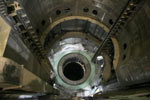 AFP: Crucial aspects of Iran’s nuclear program remain a puzzle to the outside world, and Tehran prefers to exploit uncertainty about whether it has begun building an atomic bomb, analysts said Monday.
AFP: Crucial aspects of Iran’s nuclear program remain a puzzle to the outside world, and Tehran prefers to exploit uncertainty about whether it has begun building an atomic bomb, analysts said Monday.
by Dan De Luce
 WASHINGTON, June 29, 2010 (AFP) – Crucial aspects of Iran’s nuclear program remain a puzzle to the outside world, and Tehran prefers to exploit uncertainty about whether it has begun building an atomic bomb, analysts said Monday.
WASHINGTON, June 29, 2010 (AFP) – Crucial aspects of Iran’s nuclear program remain a puzzle to the outside world, and Tehran prefers to exploit uncertainty about whether it has begun building an atomic bomb, analysts said Monday.
On Sunday, the head of the CIA said Iran had enough uranium for two nuclear bombs, which could be ready to be launched in a weapon as early as 2012, a forecast experts said was in line with most outside assessments.
But spy chief Leon Panetta left open the key question of whether Iran had opted to begin assembling an atomic bomb, saying it was a matter of debate inside the regime.
“Nobody knows if Iran has taken this decision,” said Sharon Squassoni of the Center for Strategic and International Studies.
“It’s more in their interest to have this ambiguity.”
US and European intelligence agencies have struggled to nail down details of Iran’s nuclear capabilities and plans, and Tehran has used the uncertainty to its advantage.
The ambiguity has divided intelligence experts, delayed or softened international action against Tehran in recent years and helped ward off possible military action by the United States or Israel, analysts said.
“It’s a little tricky to predict when they may make a decision,” Institute for Science and International Security chief David Albright told AFP.
“But right now, I don’t think it’s in their interest to make a decision to build the bomb, because they’re still too vulnerable to having that program disrupted by military strikes.”
If it chose to produce highly-enriched uranium for a bomb, Iran at the moment would have to rely on its centrifuge plant in Natanz, which could be hit in an Israeli or US air strike.
Iranian officials have suggested they are planning a secret enrichment site, and at one point said construction work had already begun.
Washington, however, has yet to uncover official efforts inside the regime to oversee the manufacture of warheads, said Albright, a physicist who tracks clandestine nuclear programs.
Panetta’s comments about Iran’s nuclear program coincided with growing speculation US spy agencies are revising an earlier estimate that Tehran suspended work on building atomic weapons.
“The US seems to be shifting on the question of — is Iran working on nuclear weaponization?” said Albright.
A 2007 National Intelligence Estimate under former president George W. Bush concluded that Iran had halted work on assembling a warhead around 2003, while British, French and German spy services found Tehran later resumed its weapons work.
“I’ve been hearing for months that it (the new US estimate) will be closer to the European view,” said Albright.
“It’s been tricky to come up with agreed upon language. They don’t want to look like they’re reversing their decision” from 2007, he added.
Neither the United States nor its top regional ally Israel, the sole if undeclared nuclear-armed power in the Middle East, have ruled out a military strike to curb Iran’s atomic drive.
Despite mounting international pressure over its uranium enrichment work and a new round of UN Security Council sanctions adopted this month, Iran vehemently denies charges it is pursuing nuclear weapons.
The Iranian leadership increasingly views the nuclear program as “an issue of national and ideological importance,” said Alireza Nader, an analyst at the Rand Corporation.
Amid internal unrest and a troubled economy, the Iranian regime sees the nuclear program as a way of trumpeting national progress, he said.
“The nuclear program could be seen not just as a distraction but as a mark of success,” Nader added.


